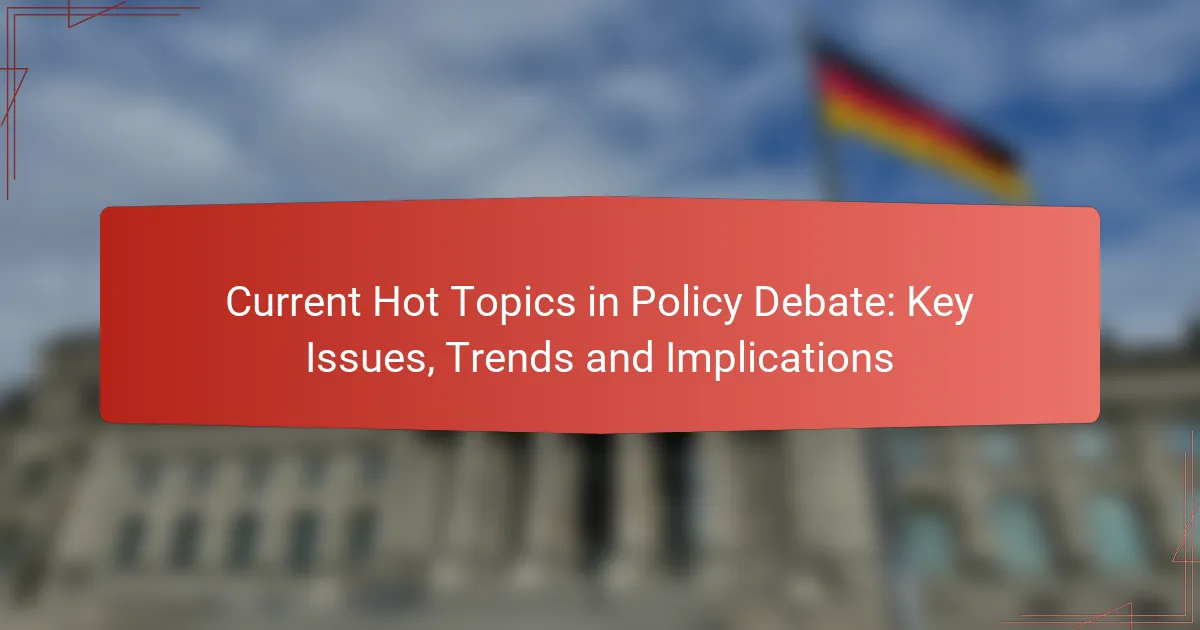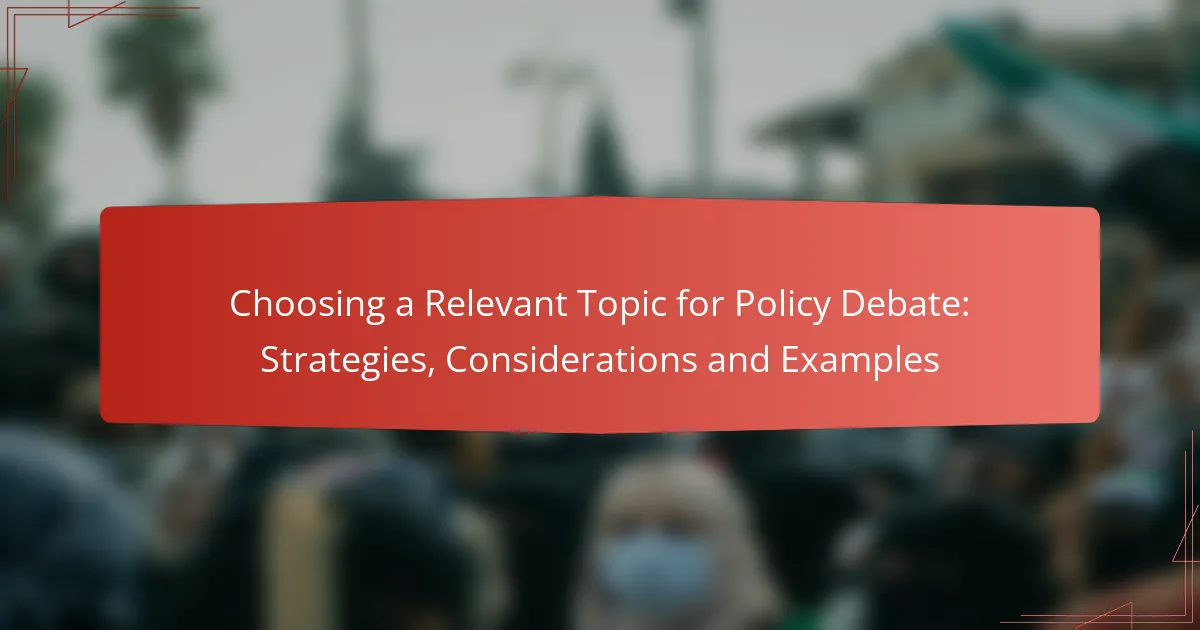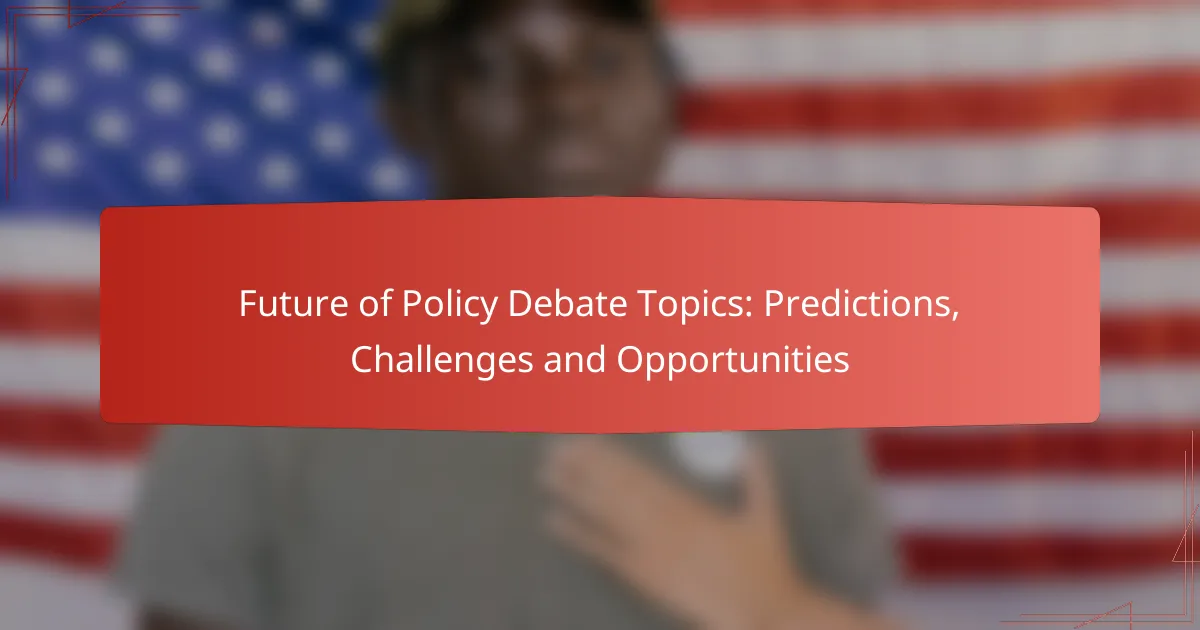Current policy debates are dominated by pressing issues such as climate change legislation, healthcare reform, and income inequality, reflecting the urgent challenges society faces today. As public engagement rises and social media plays a pivotal role, the focus on sustainability and effective solutions is reshaping discussions and priorities. Understanding these trends and their implications is crucial for stakeholders aiming to navigate the complexities of modern governance.
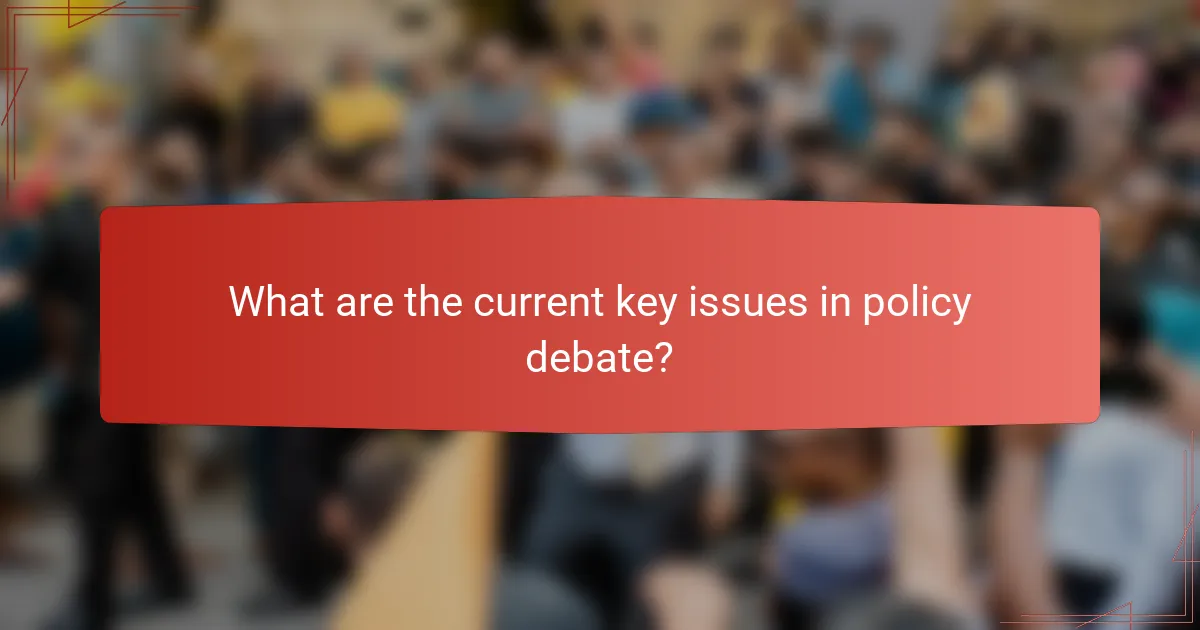
What are the current key issues in policy debate?
Current key issues in policy debate include climate change legislation, healthcare reform, income inequality, immigration policy, and data privacy regulations. These topics are at the forefront of discussions among policymakers, reflecting societal challenges and the need for effective solutions.
Climate change legislation
Climate change legislation focuses on policies aimed at reducing greenhouse gas emissions and promoting sustainable practices. Governments are increasingly implementing regulations to limit carbon emissions, incentivize renewable energy, and enhance energy efficiency.
For instance, many countries are adopting carbon pricing mechanisms, such as cap-and-trade systems or carbon taxes, to encourage businesses to reduce their carbon footprints. The effectiveness of these measures often depends on public support and international cooperation.
Healthcare reform
Healthcare reform addresses the need for accessible, affordable, and high-quality healthcare services. Policymakers are exploring various models, including public options, private insurance reforms, and cost-control measures.
In the United States, for example, debates continue over the Affordable Care Act and proposals for universal healthcare. Key considerations include funding mechanisms, the impact on healthcare providers, and patient outcomes.
Income inequality
Income inequality refers to the uneven distribution of wealth and resources within a society. This issue has gained prominence as disparities in income and opportunity have widened in many regions, leading to calls for policy interventions.
Potential solutions include progressive taxation, minimum wage increases, and social safety nets. Policymakers must weigh the economic implications of these measures against their potential to reduce inequality and promote social mobility.
Immigration policy
Immigration policy encompasses the laws and regulations governing the entry and status of individuals in a country. This topic is often contentious, with debates focusing on border security, pathways to citizenship, and the economic impact of immigration.
Countries are increasingly considering reforms that balance national security with humanitarian concerns. For example, some nations are implementing more flexible visa programs to attract skilled workers while addressing illegal immigration through various enforcement measures.
Data privacy regulations
Data privacy regulations aim to protect individuals’ personal information from misuse and unauthorized access. As digital data collection grows, so does the need for comprehensive laws that govern how data is handled by businesses and governments.
Legislation such as the General Data Protection Regulation (GDPR) in Europe sets strict guidelines for data protection, influencing similar laws worldwide. Organizations must ensure compliance to avoid significant penalties and maintain consumer trust.
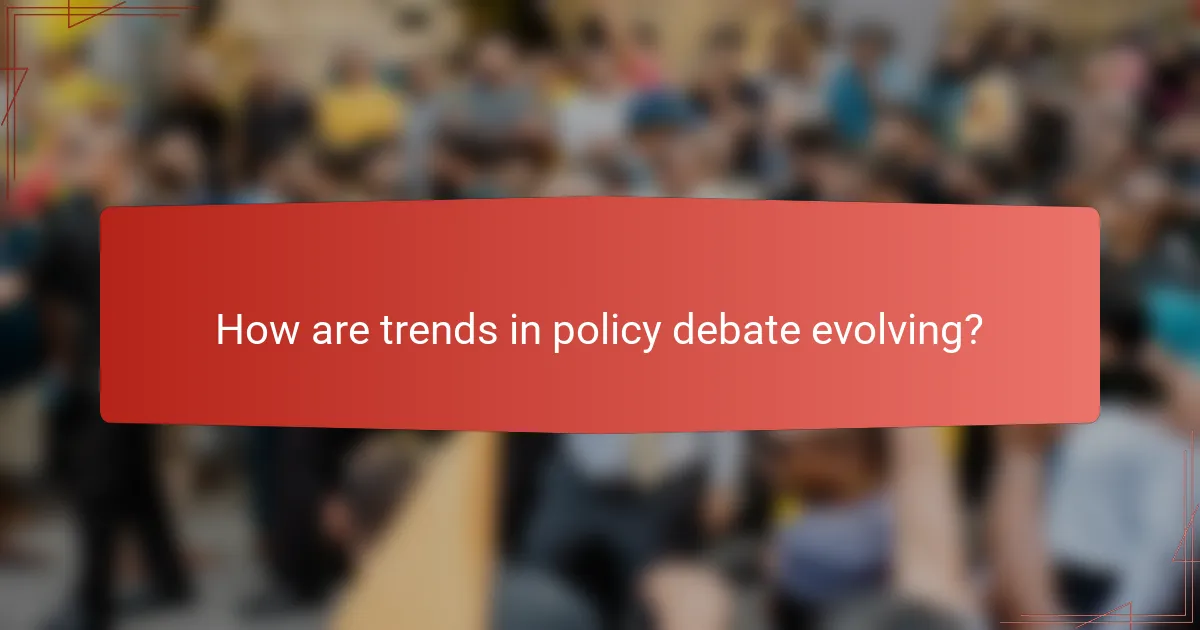
How are trends in policy debate evolving?
Trends in policy debate are increasingly characterized by heightened public engagement, the influence of social media, and a strong focus on sustainability. These factors are reshaping how discussions are conducted and what issues are prioritized in the public sphere.
Increased public engagement
Public engagement in policy debate has surged, driven by a growing awareness of social issues and the desire for community involvement. Citizens are now more likely to participate in discussions, attend town hall meetings, and voice their opinions through various platforms.
This trend is evident in grassroots movements and campaigns that mobilize individuals around specific causes, often leading to significant policy changes. For instance, local initiatives on healthcare or education reform often emerge from community-driven efforts, reflecting the collective voice of the populace.
Rise of social media influence
Social media has transformed policy debate by providing a platform for rapid information dissemination and public discourse. Platforms like Twitter and Facebook enable users to share opinions, mobilize support, and challenge traditional narratives, often in real-time.
This influence can lead to both positive and negative outcomes. While it democratizes access to information, it can also result in the spread of misinformation. Engaging critically with sources and verifying facts before sharing is crucial to maintaining the integrity of policy discussions.
Focus on sustainability
The focus on sustainability has become a central theme in policy debates, reflecting growing concerns about climate change and environmental degradation. Policymakers are increasingly pressured to consider sustainable practices in areas such as energy, transportation, and urban development.
For example, many cities are adopting green building standards and promoting renewable energy initiatives. Stakeholders should prioritize policies that not only address immediate needs but also ensure long-term environmental health, balancing economic growth with ecological responsibility.
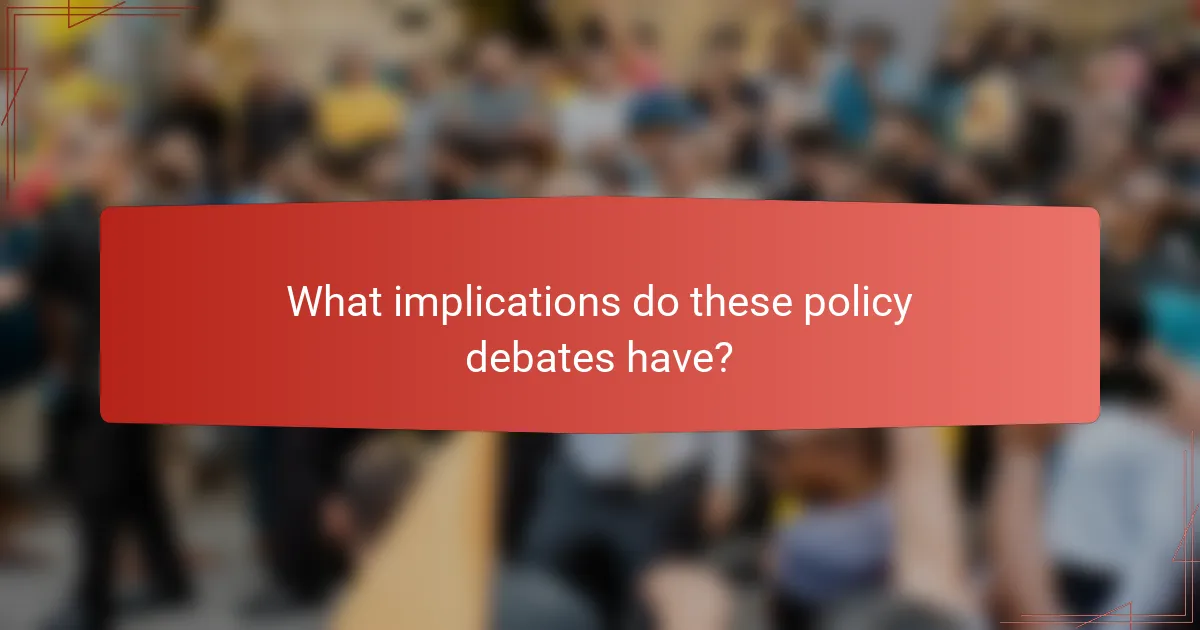
What implications do these policy debates have?
Policy debates significantly influence various sectors, shaping economic strategies, social equity, and international dynamics. Understanding these implications helps stakeholders navigate potential outcomes and make informed decisions.
Impact on economic growth
Policy debates can directly affect economic growth by influencing regulations, taxation, and government spending. For instance, favorable policies may stimulate investment and innovation, leading to job creation and increased productivity.
Conversely, restrictive regulations can hinder business operations, potentially slowing growth. Stakeholders should consider the balance between regulation and economic freedom to foster a conducive environment for growth.
Effects on social justice
Debates surrounding policy often highlight issues of social justice, impacting marginalized communities. Policies that promote equity can lead to improved access to resources, education, and healthcare, addressing systemic inequalities.
However, policies that overlook social justice can exacerbate disparities, leading to social unrest. It is crucial for policymakers to engage with affected communities to ensure that their voices are heard and considered in the decision-making process.
Changes in international relations
Policy debates can reshape international relations by altering trade agreements, diplomatic strategies, and security alliances. For example, a country adopting protectionist policies may strain relationships with trading partners, affecting global supply chains.
On the other hand, collaborative policies can enhance diplomatic ties and foster international cooperation on pressing issues like climate change. Understanding the global implications of domestic policy choices is essential for maintaining healthy international relations.
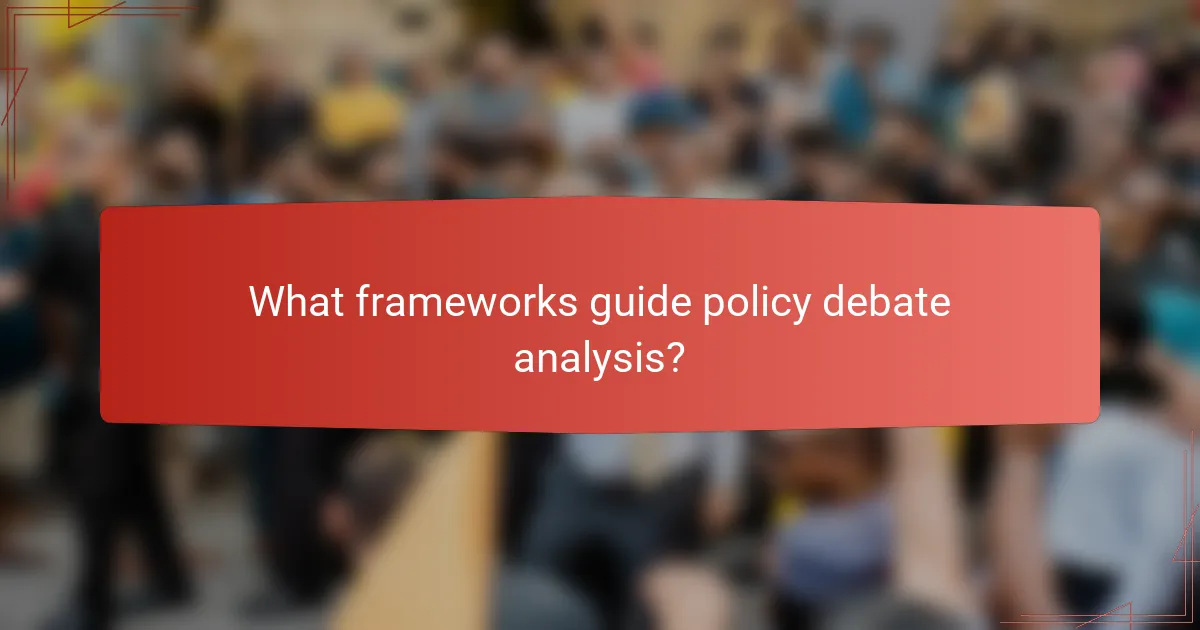
What frameworks guide policy debate analysis?
Policy debate analysis is guided by frameworks that help assess the implications and effectiveness of various policies. Two key frameworks are stakeholder analysis and cost-benefit analysis, which provide structured approaches to evaluate the interests of affected parties and the economic impacts of proposed policies.
Stakeholder analysis
Stakeholder analysis involves identifying and evaluating the interests and influences of individuals or groups affected by a policy. This framework helps in understanding who has a stake in the outcome and how their needs and concerns might shape policy decisions.
Key steps in stakeholder analysis include mapping stakeholders, assessing their influence and interest levels, and prioritizing them based on their potential impact on the policy. For example, in environmental policy, stakeholders might include local communities, businesses, government agencies, and non-profit organizations.
Common pitfalls include overlooking less powerful stakeholders who may have significant insights or failing to engage stakeholders early in the process, which can lead to resistance later on. Regularly updating stakeholder assessments is crucial as dynamics can change over time.
Cost-benefit analysis
Cost-benefit analysis (CBA) is a systematic approach to evaluating the economic pros and cons of a policy. It quantifies the expected costs and benefits, allowing policymakers to determine whether the benefits outweigh the costs and by how much.
To conduct a CBA, identify all relevant costs (e.g., implementation, maintenance) and benefits (e.g., economic growth, social improvements) associated with the policy. Assign monetary values to these factors, which can be challenging but essential for clarity. For instance, a public health initiative may have upfront costs but lead to long-term savings in healthcare expenses.
When performing a CBA, be cautious of assumptions regarding future benefits and costs, as these can be uncertain. It’s also important to consider non-monetary factors, such as social equity, which may not be easily quantifiable but are critical to the overall assessment.
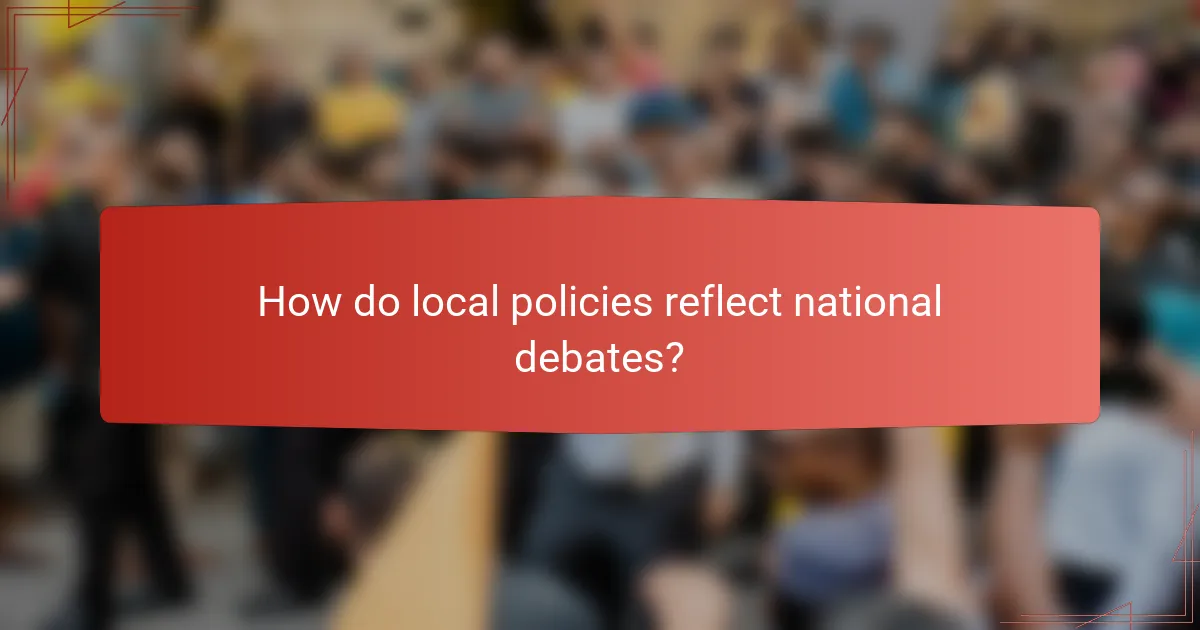
How do local policies reflect national debates?
Local policies often serve as a microcosm of national debates, translating broader issues into actionable measures that address specific community needs. These policies can highlight divergent approaches to pressing topics such as climate change and healthcare access, revealing how local governments adapt national trends to fit their unique contexts.
State-level climate initiatives
State-level climate initiatives are crucial in shaping local responses to national environmental policies. Many states have adopted ambitious goals to reduce greenhouse gas emissions, often exceeding federal targets. For instance, states like California and New York have implemented cap-and-trade systems and renewable energy mandates that directly influence local energy policies and economic strategies.
When evaluating state climate initiatives, consider the balance between environmental goals and economic impacts. Programs that incentivize renewable energy can create jobs and stimulate local economies, but they may also require significant upfront investment. Communities should assess their capacity to support such initiatives while ensuring equitable access to resources.
Local healthcare access programs
Local healthcare access programs are designed to address gaps in national healthcare policies, particularly in underserved areas. These programs often focus on expanding access to primary care, mental health services, and preventive care, ensuring that vulnerable populations receive necessary support. For example, many cities have launched mobile clinics and telehealth services to reach residents who might otherwise face barriers to care.
When developing local healthcare access initiatives, it’s essential to engage with community stakeholders to identify specific needs. Programs should prioritize affordability and accessibility, potentially utilizing sliding scale fees or partnerships with local organizations. Regular assessments can help ensure these initiatives remain effective and responsive to changing community health dynamics.

What emerging trends are shaping future policy debates?
Emerging trends in policy debates are increasingly influenced by technology, social movements, and global challenges. These factors are reshaping discussions around governance, equity, and sustainability, prompting policymakers to adapt to new realities.
Technological Advancements
Technological advancements are a significant driver of change in policy debates. Innovations such as artificial intelligence, blockchain, and renewable energy technologies are not only transforming industries but also raising questions about regulation, privacy, and ethics. Policymakers must consider how to balance innovation with public interest.
For example, the rise of AI has led to discussions about data protection and algorithmic bias. Countries are exploring frameworks to ensure that technology serves society without infringing on individual rights. Engaging with stakeholders in the tech industry can help create informed policies that foster innovation while safeguarding public welfare.
Social Movements and Public Engagement
Social movements are increasingly influencing policy debates by amplifying voices that demand change. Issues such as climate action, racial equity, and gender rights are at the forefront, pushing governments to respond to public sentiment. Policymakers are now more accountable to citizens who actively engage in advocacy and activism.
To effectively address these movements, policymakers should prioritize transparency and inclusivity in the decision-making process. Creating platforms for public input can enhance trust and lead to more effective policies that reflect the needs of diverse communities.
Global Challenges and Cooperation
Global challenges, such as climate change, pandemics, and economic inequality, are reshaping policy debates on an international scale. These issues require collaborative approaches, as they often transcend national borders and impact multiple countries. Policymakers must work together to develop comprehensive strategies that address these interconnected problems.
For instance, international agreements like the Paris Agreement on climate change illustrate the need for cooperation. Countries must commit to shared goals while also considering their unique circumstances and capacities. Effective policy responses will involve balancing national interests with global responsibilities.
